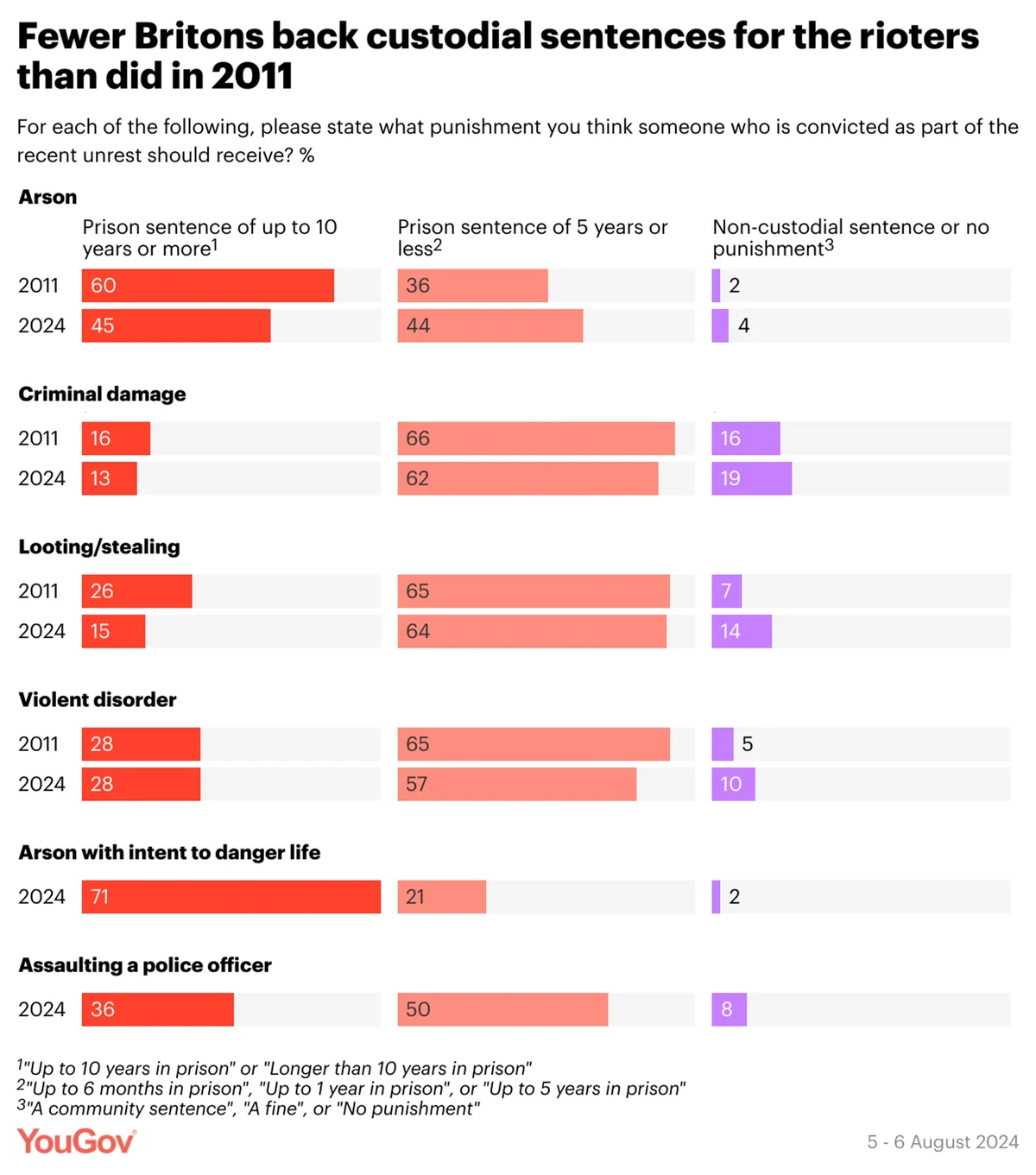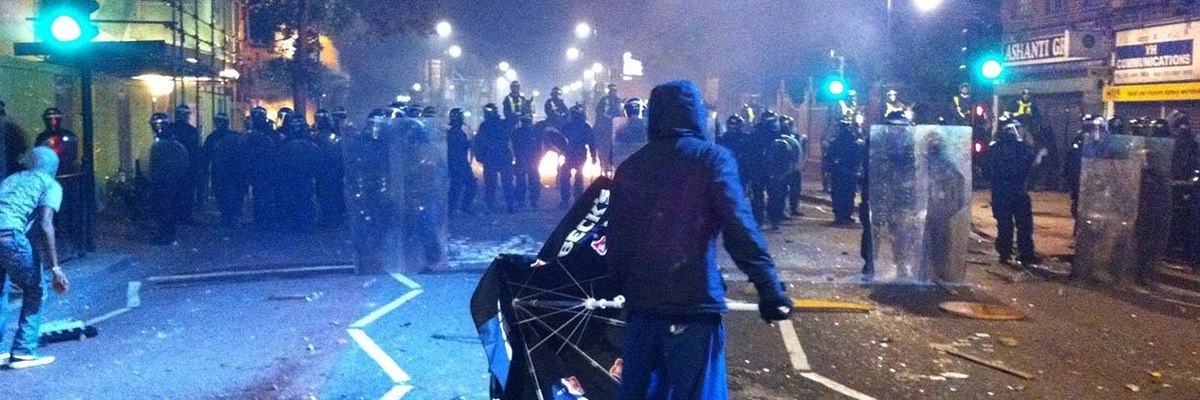Fewer Britons say riots are being handled well than in 2011, and there is greater leniency towards the rioters
The riots seen over the last week, ostensibly caused by the killing of three girls in Southport, are the largest outbreak of violent unrest in Britain since the riots in August 2011, for which the police shooting of Mark Duggan was the apparent trigger. As with then, the public have been overwhelming in their opposition to the disorder, but how does their broader reaction compare to 13 years ago?
Although the majority of the public can’t really recall them in enough detail, those with a memory of the 2011 riots are much more likely to feel they were handled badly than well, with the 32% of Britons holding a negative memory of how the last riots were handled more than twice that of the 14% who recall them being well handled.
This is actually a marked contrast with the public’s feelings during the 2011 riots, which were more balanced in terms of viewing the police and key politicians as having handled the unfolding unrest well.
In August 2011, two-thirds of Britons (65%) felt the police were handling the unrest well, with nearly half (45%) feeling the same of then prime minister David Cameron. Home secretary Theresa May was viewed more critically, but even then it was not quite at a rate of two-to-one against – three in ten Britons (31%) believed she was doing a good job, with 53% disagreeing.
Today, though, the proportion of the public feeling the police and politicians are handling the riots well is significantly lower. Just half of Britons (52%) feel the police have handled the disorder well, down 13 percentage points on 2011, with only three in ten (31%) thinking the same of prime minister Keir Starmer, 14 points lower than with Cameron.
New home secretary Yvette Cooper’s response is similarly weaker than her predecessor, just 23% of the public believing she has handled things well, eight points fewer than felt that of Theresa May.
But the lower proportion of Britons feeling this set of riots have been well handled is not really down to a higher proportion feeling they are being handled badly, but rather a much higher rate of the public being unsure, perhaps yet to form a full judgement.
When it comes to the police and the prime minister, the number of Britons feeling they are handling the current riots badly is roughly the same as in 2011 – a third (32-34%) consistently feeling the police aren’t meeting the challenge, while half felt the same both of David Cameron in 2011 (52%) and Keir Starmer today (49%). Fewer Britons (43%) think Yvette Cooper is handling the riots badly than the 53% who thought that of Theresa May in 2011.
Public less likely to back use of force against rioters than in 2011
While the public might be less satisfied with the policing and political response to the unrest than in 2011, they are significantly less likely to view the police as treating the rioters too lightly.
In 2011, over eight in ten Britons (84%) felt the police were not being tough enough on rioters, with a negligible 1% feeling the police were being too tough. While the public are still of the view that the police should go further, they are not as near unanimous as they were 13 years ago – a slim majority (52%) now feeling that the police response has not been tough enough, with 6% feeling they are being too tough.
This noticeably lower level of desire for a tougher police response can also be seen in what the public feel the police should be able to use against the rioters, with support for various forms of force against rioters declining nearly across the board.
Although around three-quarters of Britons (72-75%) still support the use of water cannons, mounted police and curfews in dealing with the rioters, this support is consistently ten points lower than in 2011, with public approval for water cannons falling fifteen points from 90% to 75%.
Clear falls are also apparent with tear gas, from 78% in 2011 to 64% today, and plastic bullets, where a two-thirds (65%) approval has given way to little more than half of the public (48%) viewing their use as appropriate. The hardest sanction of live ammunition has also fallen, though from a much lower level, having never been supported by the majority of Britons. Only in five Britons (19%) would now support their use on rioters, down from a third (33%) who felt that way previously.
Tasers are the only exception to the general trend, with three-quarters of Britons (75%) today believing they should available for use against rioters, similar to the 72% who felt so 13 years ago.
Fewer Britons back tough sentences for rioters than in 2011
Greater leniency towards the rioters carries over to potential sentences. During the last major riots, nine in ten Britons (91%) felt looting or stealing should result in at least some time in prison, with a quarter (26%) favouring a sentence longer than five years. These figures have now dropped over ten points each to 79% and 15%.
This pattern is also true of those committing arson, with support for sentences longer than five years dropping from 60% to 45%; criminal damage, for which only three-quarters (75%) support a prison sentence of any length, down from 82% previously; and violent disorder, where support for punishments more severe than community service has fallen from 93% to 85%, although preferences for longer sentences has held steady at 28%.

Sympathies with the rioters probably plays a role in this. Reform UK voters, who are most likely to be sympathetic to the rioters, are consistently less likely to support a custodial sentence for these crimes than the country as a whole and other voter groups. A quarter of Reform supporters (26%) believe rioters committing criminal damage should not be punished with a custodial sentence, compared to one in nine Conservatives (11%) and one in six Labour voters (17%).
Reform voters are also far more likely to think the rioters should be lightly punished for assaulting a police officer, 5% believing they should receive no punishment and 15% believing they should only receive a non-custodial sentence. This compares to just 6% of Conservative, Labour or Lib Dem voters. While, of course, this does mean most Reform voters do support custodial sentences for rioters committing these offences, what it shows is that – unlike in 2011 – there is a small but supportive political constituency for the rioters.
Beyond the confines of the criminal justice system, there have also been calls during both sets of riots for those involved to face broader punishments. In 2011, this included proposals for them to be evicted from council housing or having their benefits stopped, while recently has involved plans to bar rioters from attending football matches for five years.
But appetite for these non-judicial punishments has likewise fallen relative to 2011. While the majority of the public still support ideas like making rioters repair damage they’ve caused or banning them from social media, it is consistently at a lower level than 13 years ago.
Belief that rioters should have to help repair damage they’ve caused is still at an overwhelming nine in ten Britons (89%), though this is down from an even more unanimous 95% in 2011. Seven in ten (68-70%) also think rioters should have to personally apologise to their victims and receive bans from social media, though this is a decline from the eight in ten (79-81%) Britons who favoured these forms of retribution over a decade ago. The new proposals to ban rioters from attending football matches holds a similar level of support (70%).
The smallest fall in support from 2011 among the ideas polled is the idea that rioters should have their benefits removed, 63% of the public are in favour of such a scheme, only slightly down on than the two-thirds (68%) who approved of it during the last set of riots. The largest fall in support, though, is a belief that rioters should be evicted from council housing, which has fallen 14 points from 62% to 48%.
Again, we see significantly more opposition to some of these ideas among Reform UK voters. For example, with a social media ban, support among Conservative (76%), Labour (75%) and Lib Dem (79%) voters is only slightly below 2011 levels, with limited opposition (9-13%). But with Reform supporters, just over half (54%) support such a proposal, while a third (34%) are opposed. The same picture is apparent when looking at banning rioters from football matches and making them apologise to their victims – roughly three in ten Reform supporters (28-32%) are opposed to such plans, compared to only around one in ten voters (7-12%) for the other main parties.
Britons have less confidence in the criminal justice system than in 2011
Back in 2011, a majority of Britons (53%) said they had confidence in the police’s ability to protect people and property from the rioters, though nearly as many (46%) lacked confidence. Now, however, only four in ten (38%) have at least some confidence in the police’s ability to keep them safe, while six in ten (58%) have little-to-no confidence in them.
The same basic picture is true looking at Britons’ faith in the courts ability to sentence the rioters effectively, though the swing has been even more drastic. In 2011, 61% of the public trusted the courts to give appropriate sentences, a proportion that has nearly halved to just 34% today.
As with the other questions here, the lower levels today than in 2011 are partially down to a general rise in people saying they ‘don’t know’, perhaps having not fully formed their view, but also pulled down further by Reform UK voters being noticeable exceptions. Take confidence in the police, for instance. Half of Labour and Lib Dem voters (48-51%) have confidence they’ll keep them safe, something true of four in ten Conservatives (42%). But with Reform voters, that figure is just one in five (20%).
Yet regardless of this relative pessimism over the handling of the riots, Britons are more optimistic that those rioting will be caught, prosecuted and punished than they were in 2011.
Back then, only one in eight Britons (13%) expected the majority of rioters to eventually face the criminal justice system, with 85% believing the majority of them would get away with it. Today, more than one in five (22%) expect mass prosecutions, while the proportion sceptical that punishment will be meted out has fallen 15 points to 70%.
What do you think about the response to the riots, law and order in general, and everything else? Have your say, join the YouGov panel, and get paid to share your thoughts. Sign up here.
Photo: Getty








